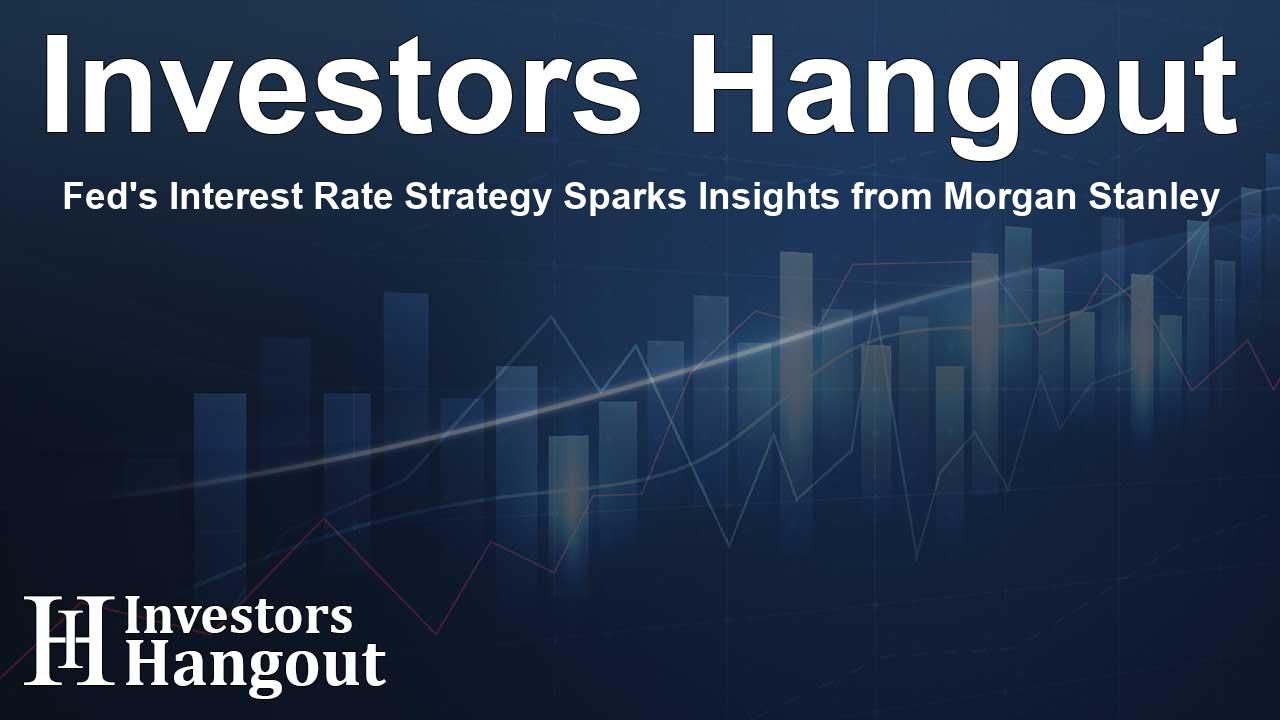Fed's Interest Rate Strategy Sparks Insights from Morgan Stanley

Morgan Stanley's Perspective on the Federal Reserve's Next Moves
The U.S. Federal Reserve is set to continue its trend of cutting interest rates, potentially in November. This decision comes amid a complex economic landscape, where inflation isn't decreasing as quickly as anticipated. Morgan Stanley Wealth Management's Chief Investment Officer, Lisa Shalett, provided insights on this topic at the Reuters Global Markets Forum.
Understanding the Current Economic Climate
Shalett pointed out that the labor market currently presents a mixed picture. While some areas show strength, others indicate underlying weaknesses, reflecting a broader uncertainty. According to Shalett, the Fed seems to have adjusted its targets, indicating they might not aim for the traditional 2% inflation threshold anymore.
Market Reactions and Future Expectations
Recently, most Federal Reserve policymakers have signaled their support for additional rate cuts in the upcoming months. However, there’s a split opinion, as noted by Atlanta Fed President Raphael Bostic, who suggested that skipping a rate cut in November might also be wise.
Implications for the Equity and Bond Markets
Despite the plan for possible rate cuts, Shalett observes that the equity market has yet to fully recognize these shifts. At the same time, the bond market appears to be reacting, particularly with long-term rates. This comes as investors adjust their expectations about inflation, especially following data indicating that U.S. consumer prices exceeded forecasts in September while producer prices remained stagnant.
Predictions for Monetary Policy Decisions
Current trading positions suggest there's a high probability, at 89%, for a 25 basis-point rate cut during the Fed's meetings on November 6-7. Earlier forecasts for a larger, half-point cut have been re-evaluated in light of robust employment figures and economic indicators. However, uncertainty lingers as the U.S. presidential election approaches on November 5, with dynamics in battleground states indicating a tight race between key candidates.
Strategies for Investors Amid Market Volatility
In light of these developments, Shalett has been advising clients to consider diversifying their portfolios with what she refers to as “real assets.” This includes investments in gold, commodities, real estate, and energy infrastructure, which can act as a buffer against the potential volatility in the markets.
Exploring Alternative Investment Strategies
Additionally, Morgan Stanley emphasizes the value of market-neutral hedge fund strategies amid rising uncertainty. By adopting these approaches, investors can better position themselves to navigate through economically turbulent times, ensuring protection against market fluctuations while potentially capitalizing on emerging opportunities.
Frequently Asked Questions
What economic factors drive the Fed's decision to cut rates?
The Fed's decision to cut rates is primarily driven by current inflation levels and the state of the labor market. When inflation slows and economic indicators show uncertainty, the Fed often seeks to stimulate growth through lower rates.
How does the Fed's focus on inflation impact everyday consumers?
Changes in interest rates can influence various aspects of consumer finance, including loan and mortgage rates, making borrowing cheaper or more expensive depending on the Fed's decisions.
Why does Morgan Stanley favor real assets for investment?
Morgan Stanley suggests real assets as a hedge against inflation and market volatility. These assets, such as gold and real estate, typically hold their value or appreciate, making them safer investments during turbulent times.
What are market-neutral hedge funds?
Market-neutral hedge funds aim to minimize market risk by balancing long and short positions. This strategy allows them to perform well regardless of overall market conditions, providing a level of protection to investors.
How are the upcoming presidential elections affecting the stock market?
The tight race in the presidential elections creates uncertainty, affecting investor confidence and market conditions. Such uncertainty can lead to market volatility as investors react to potential outcomes and policies of future leadership.
About The Author
Contact Lucas Young privately here. Or send an email with ATTN: Lucas Young as the subject to contact@investorshangout.com.
About Investors Hangout
Investors Hangout is a leading online stock forum for financial discussion and learning, offering a wide range of free tools and resources. It draws in traders of all levels, who exchange market knowledge, investigate trading tactics, and keep an eye on industry developments in real time. Featuring financial articles, stock message boards, quotes, charts, company profiles, and live news updates. Through cooperative learning and a wealth of informational resources, it helps users from novices creating their first portfolios to experts honing their techniques. Join Investors Hangout today: https://investorshangout.com/
The content of this article is based on factual, publicly available information and does not represent legal, financial, or investment advice. Investors Hangout does not offer financial advice, and the author is not a licensed financial advisor. Consult a qualified advisor before making any financial or investment decisions based on this article. This article should not be considered advice to purchase, sell, or hold any securities or other investments. If any of the material provided here is inaccurate, please contact us for corrections.
